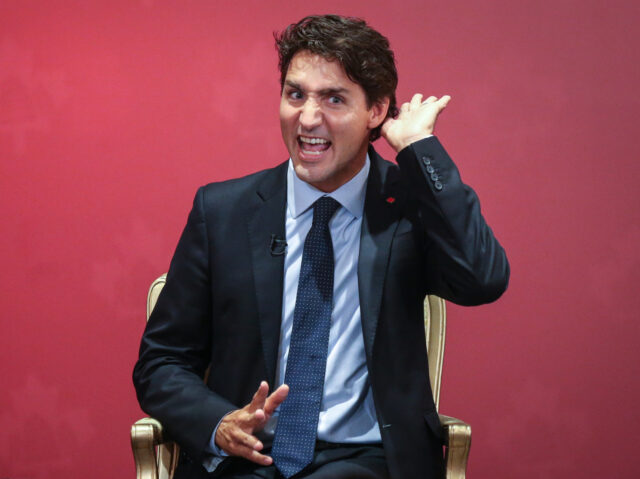Far-left Canadian Prime Minister Justin Trudeau told the audience at a climate change event on Tuesday that he believed the escalation of the Russian invasion of Ukraine was “accelerating” the “energy transition” away from fossil fuels and towards a zero-carbon electric grid.
Trudeau asserted that Europe’s heavy reliance on Russian oil and natural gas clearly endangered the continent and positions countries like Canada, with its own abundant natural resources, to usurp the dominance that tyrannies like Russia and China have taken in both fossil fuels and industries such as rare-earth metals, used for many of the products necessary for a “green” economy.
Russia first invaded Ukraine in 2014, a year before Trudeau became prime minister, and colonized its Crimean peninsula. The world reacted to the first eight years of war in Ukraine with marked apathy before this February, when Russian leader Vladimir Putin announced a “special operation” to “liberate” the entire country from “Nazism.” Ukrainian President Volodymyr Zelensky, who is Jewish, has vehemently denied that he and his government, once derided as “pro-Russian,” was “Nazi” and regularly urges the world to fund and arm Kyiv.
After the Ukraine war became a popular conversation topic in February, Trudeau became one of Zelensky’s most vocal supporters, visiting Ukraine himself in May.
Elsewhere in the climate conversation on Tuesday – held at the Canadian Climate Institute – Trudeau insisted that the idea that climate change is both real and a matter to be dealt with through heavy-handed government intervention was “no longer a political debate” in Canada and lamented that climate believers spent “a lot of time talking about … the challenge of fighting climate change” without highlighting “the opportunities.”
Trudeau made the remarks in a discussion hosted by Bloomberg’s Akshat Rathi, host of the “Zero” podcast.
Asked directly if the ongoing war in Ukraine would “delay Canada’s energy transition,” as European countries seek alternative sources of fossil fuels other than Russia, Trudeau answered, “No! It’s accelerating it.”
“It is absolutely accelerating it. As people are saying, ‘Wow, we built an economic model and prosperity in some parts of the world, including in Europe, that was reliant on energy inputs from Russia,’ as they have to get off of that,” Trudeau argued, “people are realizing, ok, getting off of Russian oil and gas means getting onto more oil and gas to replace that from elsewhere.'”
“But it’s also showing, ok, we need to accelerate our moves off of oil and gas our moves to decarbonize the gas at least,” he continued, “so that we can actually not be reliant on Russia but, more than that, not be reliant as democracies on autocracies.”
Trudeau then accused Western countries of “underpinning” their economies on dictatorships, which undermines the message that free societies are self-sufficient and preferable to tyrannies.
“We a lot of time since the beginning of the war in Ukraine pointing out that democracies with freedoms, rights, thoughtful capitalist models, are the best solution for people around the world,” Trudeau said, “and, yes, you should all become democracies, except for sort of avoiding the fact that underpinning those democracies is a reliance on cheap energy and cheap raw material inputs from countries that do not share our values or our approach.”
Trudeau lamented, “we can’t actually make the case that democracy is better for the world, that our Western civilization in all its forms is better, if it’s reliant on authoritarian dictatorships.”
He offered Canada as the perfect economic alternative to Russia and China.
“That’s where Canada comes in, right, where we actually have the kinds of resources that you find in a Russia or a China but we have labor standards, we have environmental standards, we have democracy, we have human rights, we recognize our challenges and mistakes and we work to tackle them,” he said, “we have freedom of expression and political freedoms that actually make us more reliable, more robust, more resilient as trading partners.”
While Canada has long enjoyed a far superior reputation on human rights than dictatorships like Canada or Russia, Trudeau’s leadership significantly jeopardized it at the beginning of this year with its reaction to the “Freedom Convoy,” a series of peaceful protests against Trudeau’s civil rights violations tied to Chinese coronavirus response. The Freedom Convoy protesters, largely truckers who parked their vehicles in Ottawa as a form of protest, demanded an end to “vaccine passports” trapping those who did not receive doses of coronavirus vaccine products in the country, pandemic-related lockdowns, mask mandates, and other civil rights abuses.
Trudeau regularly justified the deprivation of rights of those who did not choose to inject themselves with coronavirus vaccination products, referring to them as racist and sexist.
“They don’t believe in science/progress and are very often misogynistic and racist,” Trudeau said of those who chose against the vaccine products last year.
Trudeau’s government shut down the Freedom Convoy protests violently, at one point trampling an indigenous elder with a police horse. The Freedom Convoy fiasco resulted in nations such as China and El Salvador mocking Trudeau for claiming to support democracy.
Elsewhere in Tuesday’s conversation, Trudeau declared that China is “positioned to be the supplier of energy in a net-zero world” despite the economy being so reliant on domestic fossil fuel supplies and promised that Canada would stop emitting any carbon at all by 2050.
“We spent a lot of time talking about the imperative of fighting climate change, the challenge of fighting climate change, and it is only more recently that the opportunities we talked about that would come seven years ago we’re starting to see,” Trudeau argued, “as the world is shifting in a much stronger way as the positive feedback loops are kicking in as people are realizing … that shift is here and it’s coming.”
Follow Frances Martel on Facebook and Twitter.

COMMENTS
Please let us know if you're having issues with commenting.